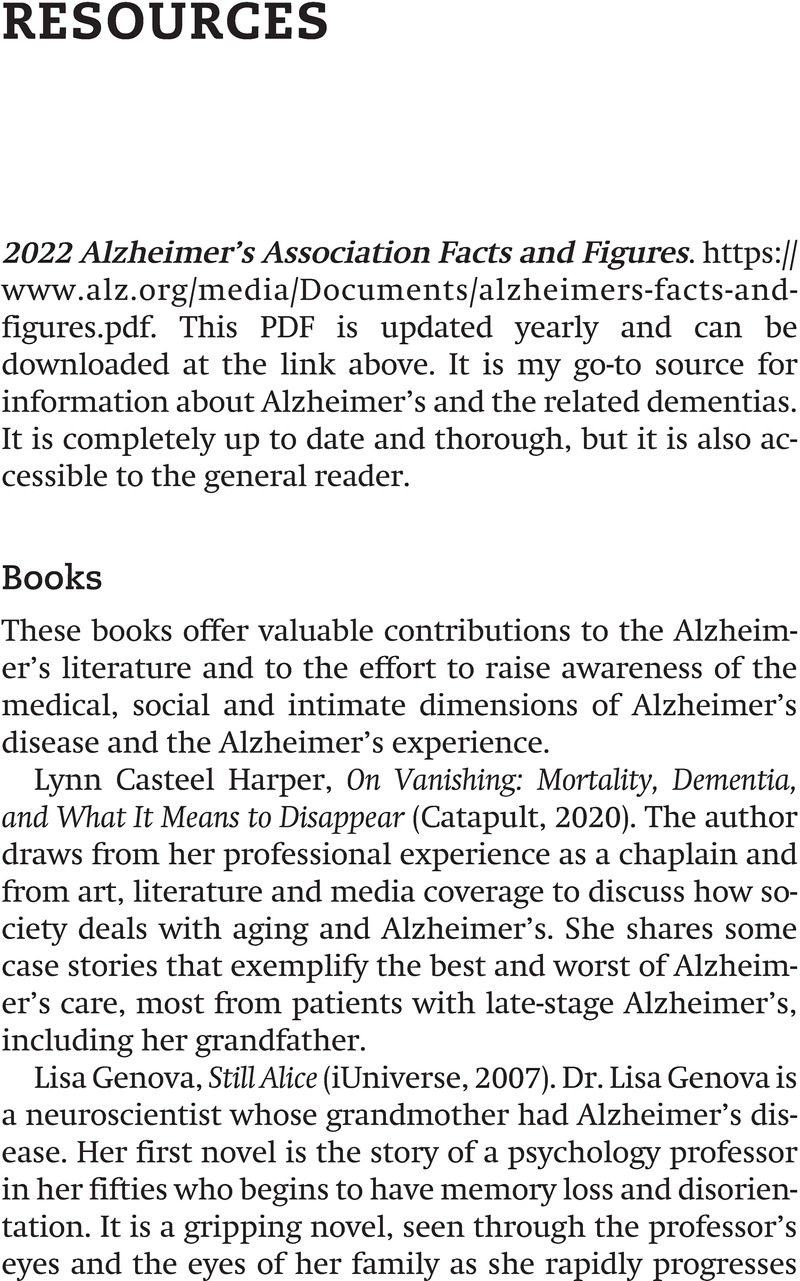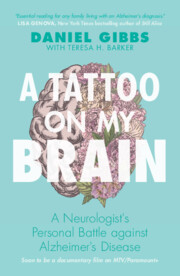Book contents
- A Tattoo on My Brain
- Reviews
- A Tattoo on My Brain
- Copyright page
- Dedication
- Contents
- Acknowledgments
- Introduction
- Prologue
- 1 Beacon Rock
- 2 Forewarned and Forearmed
- 3 The Smell of Baking Bread
- 4 Sneak Preview
- 5 A Stubborn Puzzle
- 6 The Locked Box and the Family Tree
- 7 The Measure of Memory
- 8 Orcas Nonetheless
- 9 My Brain, My Self
- 10 The Reveal
- 11 Cognitive Reserve and Resiliency: Brain Cells in the Bank
- 12 My Experimental Life
- 13 When ARIA Is More than an Operatic Solo
- 14 My Experiential Life: Living with Early-Stage Alzheimer’s Disease
- 15 Madeleines, Music and African Doves
- 16 It’s Only Scary If You Look Down
- 17 Beyond DNA: Family History Reconsidered
- 18 News at 5: Retired Neurologist Battles Alzheimer’s
- 19 The Forest, the Trees and the Ground Beneath My Feet
- 20 What’s in a Name? Alzheimer’s Reimagined
- 21 A Meaningful Outcome
- Epilogue: The Writing Life
- Epilogue: The Writing Life, Act II
- Appendix:
- Resources
- Index
- References
Resources
Published online by Cambridge University Press: 12 November 2022
- A Tattoo on My Brain
- Reviews
- A Tattoo on My Brain
- Copyright page
- Dedication
- Contents
- Acknowledgments
- Introduction
- Prologue
- 1 Beacon Rock
- 2 Forewarned and Forearmed
- 3 The Smell of Baking Bread
- 4 Sneak Preview
- 5 A Stubborn Puzzle
- 6 The Locked Box and the Family Tree
- 7 The Measure of Memory
- 8 Orcas Nonetheless
- 9 My Brain, My Self
- 10 The Reveal
- 11 Cognitive Reserve and Resiliency: Brain Cells in the Bank
- 12 My Experimental Life
- 13 When ARIA Is More than an Operatic Solo
- 14 My Experiential Life: Living with Early-Stage Alzheimer’s Disease
- 15 Madeleines, Music and African Doves
- 16 It’s Only Scary If You Look Down
- 17 Beyond DNA: Family History Reconsidered
- 18 News at 5: Retired Neurologist Battles Alzheimer’s
- 19 The Forest, the Trees and the Ground Beneath My Feet
- 20 What’s in a Name? Alzheimer’s Reimagined
- 21 A Meaningful Outcome
- Epilogue: The Writing Life
- Epilogue: The Writing Life, Act II
- Appendix:
- Resources
- Index
- References
Summary

- Type
- Chapter
- Information
- A Tattoo on my BrainA Neurologist's Personal Battle against Alzheimer's Disease, pp. 205 - 207Publisher: Cambridge University PressPrint publication year: 2023
References
Resources
2022 Alzheimer’s Association Facts and Figures. https://www.alz.org/media/Documents/alzheimers-facts-and-figures.pdf. This PDF is updated yearly and can be downloaded at the link above. It is my go-to source for information about Alzheimer’s and the related dementias. It is completely up to date and thorough, but it is also accessible to the general reader.
These books offer valuable contributions to the Alzheimer’s literature and to the effort to raise awareness of the medical, social and intimate dimensions of Alzheimer’s disease and the Alzheimer’s experience.
Lynn Casteel Harper, On Vanishing: Mortality, Dementia, and What It Means to Disappear (Catapult, 2020). The author draws from her professional experience as a chaplain and from art, literature and media coverage to discuss how society deals with aging and Alzheimer’s. She shares some case stories that exemplify the best and worst of Alzheimer’s care, most from patients with late-stage Alzheimer’s, including her grandfather.
Lisa Genova, Still Alice (iUniverse, 2007). Dr. Lisa Genova is a neuroscientist whose grandmother had Alzheimer’s disease. Her first novel is the story of a psychology professor in her fifties who begins to have memory loss and disorientation. It is a gripping novel, seen through the professor’s eyes and the eyes of her family as she rapidly progresses through early-onset, autosomal-dominant Alzheimer’s. I read it in 2009 before I had any idea that I would have Alzheimer’s, and it made a profound effect on the way I understood and interacted with my dementia patients.
Joseph Jebelli, In Pursuit of Memory: The Fight Against Alzheimer’s (Little, Brown & Company, 2017). This is another book by a young neuroscientist. His grandfather died of Alzheimer’s, and he does research in the field. It is a substantive, nonfiction history of Alzheimer’s disease, from the story of Dr. Alois Alzheimer’s first discoveries, to a number of individual personal stories of people with the disease, to a survey of current knowledge and research.
Jason Karlawish, The Problem with Alzheimer’s: How Science, Culture and Politics Turned a Rare Disease into a Crisis and What We Can Do About It (St. Martin’s Press, 2021). Dr. Karlawish is a professor and co-director of the Penn Memory Center at the University of Pennsylvania. This book is comprehensive yet accessible, covering the history, politics, and controversies surrounding Alzheimer’s disease. It is thorough and it is compassionate. I highly recommend it.
Lauren Kessler, Dancing with Rose: Finding Life in the Land of Alzheimer’s (Penguin Books, 2007). After her mother died of Alzheimer’s, Kessler, who teaches nonfiction writing at the University of Washington, immersed herself in the world of dementia care by working for six months in an entry-level job at a local Memory Care facility. This is not an expose´ of the nursing home industry. It is more about the lessons that she learned about getting close to people with advanced dementia and appreciating not only what they have lost, but what they still retain and what they have to offer. She begins to understand the relationship she had, or in some cases failed to have, with her own mother. This is an important and touching book.
Wendy Mitchell, Somebody I Used to Know: A Memoir (Ballantine Books, 2018). Chronicling her struggle with early-onset Alzheimer’s, the author, after a career in the British health service, turns her efforts to ways to slow her cognitive decline and to help inform others about the challenges and opportunities in living with Alzheimer’s.
Greg O’Brien, On Pluto: Inside the Mind of Alzheimer’s: New Horizons Expanded Edition (Codfish Press, 2018). Greg O’Brien is a journalist who first developed signs of Alzheimer’s after a head injury in his fifties. He writes eloquently about his experiences with the disease, first caring for his parents, who both had Alzheimer’s, and then about his own battle. Greg is a friend, and appears in Tattoo.
Gerda Saunders, Memory’s Last Breath: Field Notes on My Dementia (Hachette Books, 2017). A former university professor, Saunders takes a down-to-earth approach to her annotated life with dementia, and finds rich veins of memory to explore from her childhood in South Africa.
David Snowdon, Aging with Grace: What the Nun Study Teaches Us About Leading Longer, Healthier, and More Meaningful Lives (Bantam Books, 2001). Written nearly twenty years ago, this longitudinal study of several hundred nuns as they aged transformed much of the thinking about Alzheimer’s disease and still is a fascinating read.



